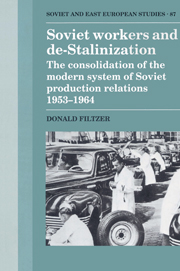 Soviet Workers and De-Stalinization
Soviet Workers and De-Stalinization Book contents
- Frontmatter
- Contents
- List of tables
- Preface and acknowledgements
- List of terms and abbreviations
- Introduction: the contradictions of-Stalinization
- Part I Labour policy under Khrushchev: issues and results
- 1 The worker and the work environment
- 2 The reform of labour legislation and the re-emergence of the labour market
- 3 The labour shortage
- 4 The wage reform
- Part II De-Stalinization and the Soviet labour process
- Conclusion
- Notes
- Bibliography
- Index of industrial, mining, and construction enterprises
- General index
- Soviet and East European Studies
3 - The labour shortage
Published online by Cambridge University Press: 29 January 2010
- Frontmatter
- Contents
- List of tables
- Preface and acknowledgements
- List of terms and abbreviations
- Introduction: the contradictions of-Stalinization
- Part I Labour policy under Khrushchev: issues and results
- 1 The worker and the work environment
- 2 The reform of labour legislation and the re-emergence of the labour market
- 3 The labour shortage
- 4 The wage reform
- Part II De-Stalinization and the Soviet labour process
- Conclusion
- Notes
- Bibliography
- Index of industrial, mining, and construction enterprises
- General index
- Soviet and East European Studies
Summary
Introduction: the emergence of the labour shortage
Since the 1930s the Soviet economy has been beset by a virtually permanent shortage of labour. The morphology of the labour shortage has, however, altered radically over the years, and so, too, has* the pattern of its reproduction. Initially, the labour shortage was the direct consequence of the unplanned process of primitive accumulation inherent in the five-year plans. The hypertrophic pace of new construction and industrial expansion created an unanticipated demand for labour power which the countryside simply could not meet. The matter was compounded by the tragedy of collectivization. Consistent with earlier stages of capitalist primitive accumulation, industrialization and collectivization saw millions of peasants forced off the land to become the new proletariat in the towns and on new construction sites. But the very methods of collectivization and the counter-reaction they provoked among the peasantry, who slaughtered livestock, ran down grain reserves, and generally adopted a hostile, sullen attitude towards the regime, spelled the death of any hopes that collectivization would lead to a capitalist-style modernization of agriculture. The numbers of peasants who could be let go from the land became limited by the demands of agriculture itself. Indeed, the regime imposed the internal passport in 1932 precisely to stanch the haemorrhage of peasants fleeing the land for higher wages on building projects or as unskilled workers in the factories.
Once created, however, the labour shortage became a central factor determining shop-floor relations. The scarcity of labour power, and the consequent elimination of unemployment as a sanction, meant that managers were almost powerless to enforce rigid discipline.
- Type
- Chapter
- Information
- Soviet Workers and De-StalinizationThe Consolidation of the Modern System of Soviet Production Relations 1953–1964, pp. 59 - 91Publisher: Cambridge University PressPrint publication year: 1992


